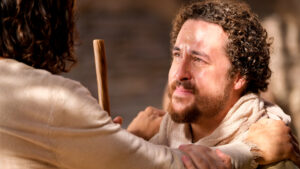Why Was Little James Not Healed?
Faith is such a confusing thing.
I have known religion my whole life. I grew up with the rules, requirements, and expectations. But faith? That is something else entirely. I have bristled with my religion; yet faith is a little harder to shake. I have studied religion through the lens of the religious, then I did so again as an academic.
Faith cannot be intellectualized. Faith is a feeling and the decision to trust that feeling. It is without certainty, it is at times uncomfortable, but it holds weight all the same.
Recently, I have been watching the show The Chosen, a historical drama depicting Jesus’ life and teachings. It is without a doubt an incredible series; one in which you cannot help but get attached to the characters, feel what they feel and wrestle with what they wrestle with.
Here, I want to discuss one scene in particular. Episode 2 of season 3.
A coworker of mine mentioned that it had upset her – maybe rattled her would be a better way to describe it – and she stopped watching the show because of it. I spent the rest of that day, and then that evening too, thinking about what she said. Mostly because the scene bothered me as well, so I wanted to think it through a bit more.
I’ve been doing that a lot more recently. Thinking it through a bit more. Whatever it may be.
Lauren Daigle sings about losing her religion to find God. Religion tells you what you must do, what you absolutely must not do, and what everyone around you will expect from you. Faith is not so rigid. If religion is the black and white of right and wrong, then faith is in the grey.
Finding my faith again has demanded I let go of many things. There is no place for the kind of doubt that religion brings. Doubt in my choices, my lack their of, my thoughts and actions. Ultimately, religion brought me doubt in myself. Because religion was all I had. No faith to be found. Rules and restrictions were all I had.
Faith is actionable, it is the most complete form of trust. But with that, faith is having my eyes wide open; I don’t want there to be things that, because I don’t like them, because they are difficult and I don’t understand them, I just ignore the whole thing.
In this scene of The Chosen, Little James asks Jesus how he, Little James, could heal others when he has not been healed himself. We’re three seasons in at this point and Jesus has healed many people. Little James’ malady has not been explicitly stated – at least not yet – but he mentioned to Thomas previously that its some form of paralysis that he was born with. (Google says it’s cerebral palsy and scoliosis that the actor actually has).
Little James had also told Thomas that he didn’t need to be healed because Jesus had other things to worry about. But then we arrive to this moment when Jesus has all the disciples go out on missions in which they would cure illness, expel demons, preach the good news, and most importantly for this conversation, heal people. Little James, who himself suffers daily, will heal others of their suffering.

This is obviously a hard thing for him to grasp, and even harder for us as viewers, I think. Why hasn’t Jesus healed him? Why has he let Little James suffer? Why will Little James be able to heal others if he has not been healed? These are valid and important questions.
Little James goes to Jesus to understand how this could be. Jesus asks Little James if he wants to be healed. Little James says that of course he would, if it’s possible; Jesus responds that Little James should know by now that it is, so Little James asks the question we have all asked sometime in our lives: “Why haven’t you?”. Jesus’ response shocks us all because concludes that Little James will not be healed of his suffering.
Little James was one of Jesus’ first followers, before even Mary or Simon Peter where the show starts. He did not need to be healed to have faith, unlike so many people Jesus meets. Little James remains one of Jesus’ most devoted follows despite his suffering. Quite possibly, it is also because of his suffering that he is so devoted and has so much faith.
Jesus was a big fan of parables, creating metaphors for all of us to understand concepts that would seem so difficult and maybe convoluted if applied to our lives. For example, it’s hard to comprehend what it takes to get into heaven, but it’s easier to picture a camel trying to get through the eye of a needle. This is no different. A living parable.
At the most basic level, what Little James suffers with is a barrier to ease of access, something that makes his life so much more difficult to get through. Those things will always exist, and they will change for every society. Physical disabilities remain a barrier today, but so does being a woman, and especially being a minority. Should we ask God to heal us of those things? It’s true that my life would be so much easier if I were a man. It’s also true that my life would be easier if I was born rich. So, should I ask God to heal me of my suffering in these ways?
There are moments I think yes. Why shouldn’t I be rich? I would be so much better with the money. I am a good person. I am considerate of others. I would do good things with it. However, when I look at it through the lens of Little James, I am reminded of why I have all those characteristics. My struggles. My hardships. My barriers.
Jesus mentions that the work Little James will do will be so much more powerful because he remains faithful throughout his suffering. Whether you see it as faith despite his suffering, faith because of his suffering, or simply faith throughout his suffering, he remains a potent figure of devotion.
There is a joke throughout the show that Jesus always answers his disciples that things will happen soon. It is the most unspecific word we have. In this scene, Jesus also reminds Little James that the pain he feels today, the things he suffers with, are temporary, and someday soon he will live in perfect peace. Shalom, Shalom.
There have been many things in my life that I suffer with that I have asked God to take away. It has taken many years to understand the importance of the suffering. My life has been harder because I am a woman and because I grew up without much money; yet today, I would not trade those struggles for anything. Both to myself and those I interact with, I am better, more patient, and more hopeful. I learned these things in my struggles. When there is a hardship that we will never outgrow, we do not wait to be faithful.
Like Jesus tells Little James of the power of his faith despite his suffering, the strength of his abilities because of his weakness, should I not assist others, be there for others, or find ways to make my world better because there are barriers I face in my life? Could it be that I feel the calling to help others more because of what I have gone through myself? This is the power and importance of empathy. The endurance of empathy can be found in faith.
At the end of their conversation, Jesus says something that I have pondered for a long time. I first noted this idea in 2 Corinthians 12:10 – “That is why, for Christ’s sake, I delight in weaknesses, in insults, in hardships, in persecutions, in difficulties. For when I am weak, then I am strong.”
I always thought this such an odd thing to say. It goes against everything were taught. Strength in all things, never show your weaknesses and do whatever it takes to be rid of them.
Today I see how harmful that mindset is. All people struggle, all people suffer, all people face barriers to whatever their idea of success is. Yet God remains. How? Why? Our most powerful figures in history are those who do what they were told they could not do, what they should not have been able to do given the circumstances of their lives. If their lives were made simple, if they lived without struggle, then what of the next society, with its next set of barriers for those of lesser means or lesser ability? Who would be there to aid them?
Jesus calls us to serve. To be fishers of men. To be shepherds to his sheep. If there is something God has not healed me of, there is a reason, and I will learn that reason soon. We are called to be patient in our suffering because we know that someday it will end. We are called to remain faithful because of, despite, and throughout our suffering, for that is when we are able to do great things in God’s name. That is the impact that lasts for generations.
Faith is not devotion because of the good things God has given us; it is faith despite the hard things this world subjects us to. Faith through the heartbreaks we endure. Suffering is inevitable and unavoidable, but it is not the end. There is much to learn from our hardships. What if the very thing we wish God would take away is what will teach us our greatest life lessons?

